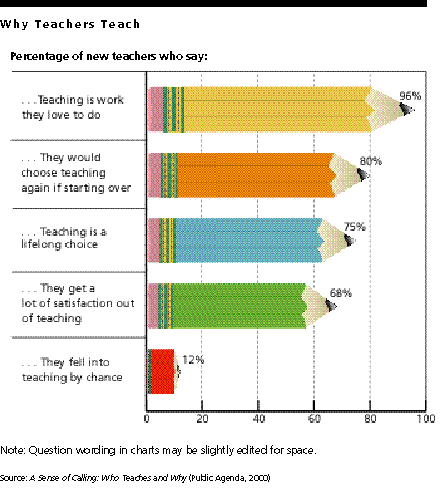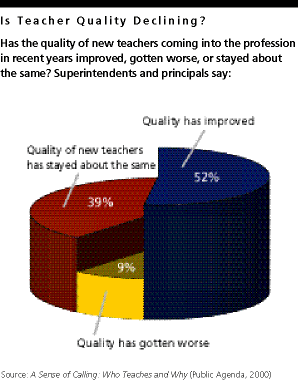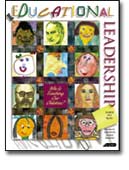Given the high priority of education in recent years and its centrality on the agenda of the Bush administration, a national discussion of standards, accountability, and high-stakes testing is sure to be front and center in the days to come. Whatever the outcome, as states and school districts debate issues, classroom teachers will inevitably be on the firing line. Our dependence on teachers to deliver the goods—to instruct, guide, inspire, motivate, cajole, and occasionally prod our kids to learn—is irrefutable, and our scrutiny of them will only intensify.
Assumptions and hypotheses about teachers—how much they know, how much they care, how well-prepared they are—are behind some policy initiatives intended to ratchet up student performance. Teacher pay and licensing, tenure and accountability, and teaching methods and morale have joined a long list of contentious issues encircling public education.
At Public Agenda, we chose to explore these issues, focusing not on policies or statistical trends but on the perceptions and assumptions, concerns and aspirations of the constituencies central to the discussion. A Sense of Calling: Who Teaches and Why (Farkas, Johnson, & Foleno, 2000) focuses on what new teachers—those currently in their first few years in the classroom—say about why they entered the profession and what they think of it now that they are on the job. It also captures the observations and concerns of those who hire and supervise teachers—school superintendents and principals—in communities across the United States and the perspectives of young college graduates who did not choose teaching as a career.
We probed many issues: Do new teachers entering the profession lack motivation and spirit, or do they bring energy and commitment with them? Have young people turned their backs on the profession? What would motivate young college graduates to take a second look at teaching as a career? Is money the chief obstacle to recruiting the most talented graduates?
What new teachers say flies in the face of some widely held assumptions among opinion leaders, not to mention the rhetoric gracing the op-ed pages. Much has been written about the quality of the U.S. teaching corps, which has been under fire for some time. Observers differ on whether teacher quality is really declining—and even those who believe that it is offer very different explanations. Some say that difficult working conditions and relatively low pay discourage talented young people from entering teaching. Some say that teacher quality has eroded as an unintended consequence of increased opportunities for women. Some fear that teaching now appeals to too many young people who have lackluster skills and little drive and are lured by the promise of secure jobs with summers off and predictable pay raises. Adding any of these arguments together brings out broad fears that new teachers are routinely disgruntled and disaffected in a job that all agree requires talent, judgment, enthusiasm, and skill.
A Sense of Calling
But an in-depth survey of 664 public school teachers and 250 private school teachers who have been in the classroom for five years or fewer suggests a dramatically different picture. At least by their own report and that of administrators, most young teachers are highly motivated professionals who bring a strong sense of commitment and high morale to their work. New teachers see themselves as talented, hardworking professionals who have responded to a calling. They convey a love of and a dedication to their craft.
New teachers are quick to point out that theirs is a profession that requires a sense of mission. More than 8 in 10 (86 percent) believe that only those with "a true sense of calling" should pursue the work. A teacher in a Cleveland school district had been uninspired by his experience in business and decided to pursue his true calling: "I have always just had the feeling that I want to get into education and work with youth."
The profession demands high levels of effort and energy, according to the teachers, and one needs to be motivated to thrive. Nine in 10 say that teaching requires more talent and harder work than many other professions—and 65 percent strongly hold that view. Enthusiasm for the job came up repeatedly in the interviews with teachers.
"You can watch for five minutes and see how teachers interact and find out whether they have a passion for teaching," said a young teacher in New Jersey. Nearly all the new teachers we surveyed fit this description—96 percent say that teaching is work they love to do, and almost 7 in 10 (68 percent) say that they are getting a lot of satisfaction from it. Said another young New Jersey teacher:I don't want to do a job that I don't like and don't have fun with. I have the chance to work with the kids and teach something that I really like and to make it interesting.
What's more, they overwhelmingly believe that the other new teachers with whom they work share their enthusiasm and commitment: 98 percent characterize their colleagues as highly motivated and energetic. This appraisal is consistent across the board for teachers in all types of schools—whether they work in urban or suburban districts, primary or secondary schools. A young teacher in Maryland explained his firm belief that enthusiasm for the job was a prerequisite for success:If I'm not excited about what I'm doing, neither are students. You have to sell it first. . . . it's a real package deal.
Why Teachers Teach

Note: Question wording in charts may be slightly edited for space.
Source:A Sense of Calling: Who Teaches and Why (Public Agenda, 2000)
There for the Right Reasons
The study asked teachers to rate the most important attributes of a job for them personally. Taken in sum, their responses indicate an idealistic personnel corps looking to do work out of love more than for money. From a list of eight attributes that a job could have—for example, opportunities for advancement, security, doing work that they love, salary—we asked teachers to identify three attributes that are most important to them. Eighty-three percent say that doing work that they love is essential. Virtually the same number (81 percent) of young teachers cite the importance of having enough time to be with family. And the third most important attribute is the sense that they are contributing to society and helping others (72 percent). Other factors, such as pay and opportunities for advancement, are not nearly as important to them.
Moreover, the vast majority of beginning teachers report that their jobs actually do offer the attributes they value most. Among the top three—contributing to society, doing work that they love, and having time with family—overwhelming percentages (97, 96, and 79 percent, respectively) say that teaching provides these attributes.
Is Teacher Quality Declining?

Note: Question wording in charts may be slightly edited for space.
Source:A Sense of Calling: Who Teaches and Why (Public Agenda, 2000)
Teacher Retention—How Big a Problem Is It?
Many experts and decision makers voice concern that new teachers are overwhelmed when they first come into the profession and soon become frustrated and eager to leave. An analysis of a U.S. Department of Education study in Education Week (Boser, 2000) concluded that about 20 percent of new teachers leave after a few years, and research for our Public Agenda study shows a comparable number (19 percent) who predict that they will probably change careers.
But what our report also shows—and what often seems lost in the debate over teacher retention—is the remarkable commitment, enthusiasm, and vitality of the majority who choose to stay. Large numbers of new teachers express strong satisfaction with their career choice, and few seem to be second-guessing the path that they chose or are planning an exit strategy. Far from doubtful, most new teachers see their work as the commitment of a lifetime: Three-quarters say that they view their current profession as a "lifelong choice."
Although the statistics on new teacher turnover have generated broad comment, they may be less jarring when seen in the context of a highly mobile workforce and compared to other young workers also in the process of "finding themselves." In this study, 19 percent of new teachers say that they'll probably change careers at some point. But 50 percent of young college graduates who did not enter teaching say that they expect to change careers.
"As Long As I Can Remember"
Still another indication that the teaching corps enjoys high levels of commitment from its newest contingent is that most are there by design, not by accident. Only 12 percent say that teaching is a career they fell into by chance; more than half (52 percent) say that it is something they had been hoping to do for some time; 34 percent say that they chose to be teachers when they were in college. Some say that they have been committed to teaching for so long that they cannot remember wanting to do anything else: "There was never anything else I was going to do, so I never had to think much about it," said a New Jersey teacher. "I wanted to be a teacher for as long as I can remember," said a teacher in Maryland. Others carefully tested the waters first: "I substituted for a couple of years to see whether teaching was what I wanted to do."
Once in the classroom, new teachers feel confident that they are in the right place, and few second-guess their choice. More than 9 in 10 (91 percent) think that their skills and interests fit well with the demands of the profession. The overwhelming majority (80 percent) say that even if they were starting all over, they would opt to become teachers.
School Administrators: Teachers Are Better Than Ever
It may not be all that surprising to hear new teachers describe themselves in positive terms, but what do their bosses—school superintendents and principals—think about the new crop of teachers? To understand management's perspective, Public Agenda randomly surveyed 511 public school principals and superintendents, asking them to pinpoint, through a full complement of questions, the strengths and weaknesses of new teachers, the areas where teacher supply is a problem, and the proposals to improve teacher quality that show the most promise. In many ways, the responses of the school administrators are some of the most provocative findings of the study—sometimes confirming, sometimes dispelling the common views about new teachers and the tenor of current policy discussions.
Overall, school administrators are remarkably upbeat. Almost all (98 percent) see the new teaching corps as highly motivated and energetic. One superintendent in an upstate New York school district explained why he thought this was true: "Two things motivate today's new teacher: Some teacher they had inspired them, and they think they can make a difference" in students' lives.
In fact, school administrators overwhelmingly reject the often-heard lament that teacher quality is on the decline. Most say that, in their experience, the quality of new teachers has either improved (52 percent) or stayed the same (39 percent). Asked whether the supply or the quality of teachers is more problematic, 50 percent of administrators point to quantity, one-third (32 percent) point to quality, and another 13 percent volunteer that neither is a problem.
The Need for Warm Bodies
Some commentators, such as Arthur Levine, president of Teachers College, warn that the increasing need for teachers threatens to collide with simultaneous efforts to toughen hiring requirements (Levine, 1999). Because they oversee the hiring of teachers and the staffing of schools, superintendents and principals are positioned to provide a "real-time" report on teacher supply. Perhaps to the surprise of experts predicting major shortages, most school administrators report that they face problems only in specific areas and that those problems are manageable.
Most school administrators face at least some type of teacher shortage, and two-thirds say they that they have to make an extra effort to recruit the teachers that they need. But few (15 percent) say that the shortage is widespread—instead, 62 percent describe the shortage as specific to particular types of teachers. And, ultimately, most feel that they are able to handle the problem.
Those intimate with the state of the teaching profession will probably not be surprised to hear where administrators say specific shortages lie: Nearly 7 in 10 (68 percent) say that there is a lack of minority teachers. "I was a rare commodity," said a young African American male teacher. "The people at my university said, 'Where do you want to go? You can write your own ticket.'" Even more administrators (90 percent) say that they are facing teacher shortages in specific subject areas, such as math, the sciences, and special education.
Not surprisingly, urban educators are feeling the crunch more than those in suburban or rural districts. More than twice as many urban administrators (26 percent urban compared with 11 percent suburban) say that they are facing a widespread shortage, and a large majority (78 percent) say that they have made extra efforts to recruit in recent years. Urban administrators (83 percent) are also more likely to say that they face a shortage of minority teachers.
Despite these problems, the overall picture makes an important point: Administrators are not yet in a panic, and many of them have yet to feel the twinges of a shortage.
The Problem That Is Not There
It is obvious that many ingredients are necessary for teachers to thrive and be effective. Desire and motivation are only part of the equation. Knowledge, training, resources, and workplace conditions are key as well. But what the Public Agenda study told us is that, by their own account, beginning teachers are where they want to be—they want to teach. The strength and vibrancy of their morale and motivation are noteworthy, if only because they strongly challenge a persistent assumption of the debate on teacher quality—that teaching is somehow attracting a group of somnolent slackers, people who are trapped in jobs that they don't really care about and who can't wait to leave. If anything, on the basis of our findings, the opposite seems to be true.
